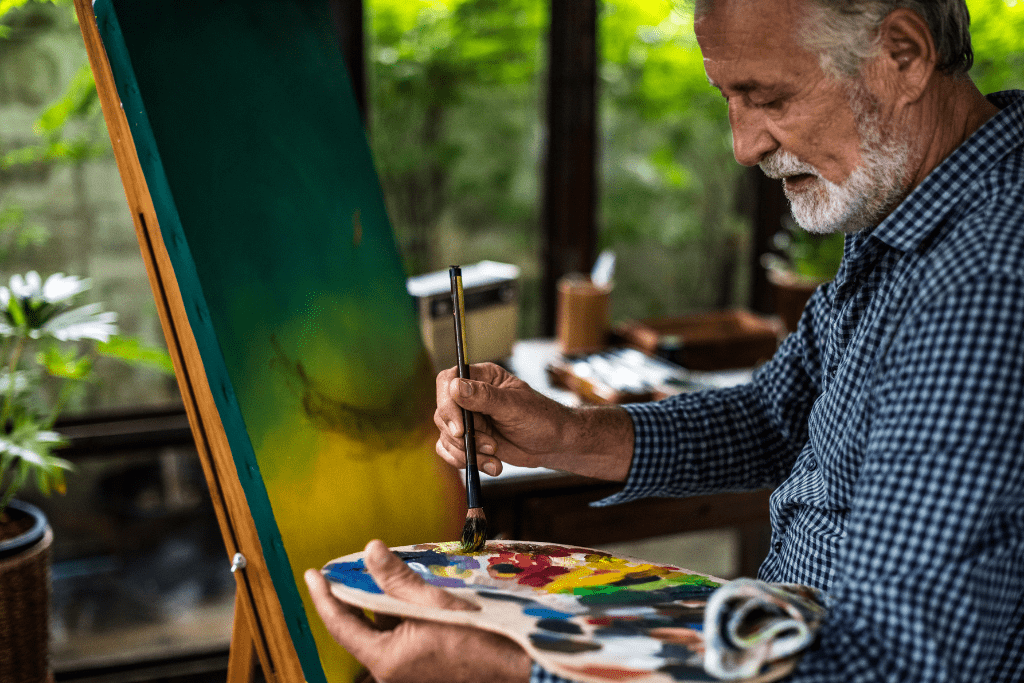
Whilst we all know that a balanced diet and exercise can help to keep us healthier for longer in retirement, did you know that participating in hobbies and staying socially active is equally as important when it comes to quality of life and longevity? Certain hobbies can improve your health and mental wellbeing and increase your happiness in retirement.
Studies of elderly people and social isolation concluded that those without adequate social interaction were twice as likely to die prematurely, with the increased mortality risk comparable to that from smoking. Loneliness is in fact about twice as dangerous as obesity¹. So your hobbies in retirement could have far-reaching health benefits beyond simply filling your time and staving off boredom, they could, in fact, save your life.
To celebrate World Mental Health Day, we’ve put together a list of our favourite health-promoting hobbies to boost your happiness in retirement.

1) Photography
Research reported by the U.S. Department of Health & Human Services looked at the social benefits of photography and found that “when community members photograph their daily lives, they may find that the bigger picture begins to emerge”. Through this, a camera can be a gateway to healthy habits, lifestyles and communities.
For retirees, who can often report feeling isolated once they are outside of the workforce, photography offers a creative way to connect with and contribute to the communities they live within. And what’s great is that you no longer need to invest in expensive camera equipment, these days anyone with a smartphone already carries an impressive, highly portable camera in their pocket.
There have been a number of articles linking photography to mindfulness, which thanks in part to apps such as Headspace and growing body of researching promoting its benefits, has seen a rise in popularity in the UK.
In their book Mindfulness: A Practical Guide to Finding Peace in a Frantic World, Mark Williams and Dr Danny Penman describe Mindfulness as ‘observation without criticism’. It is easy to see then how Photography and Mindfulness can go hand in hand: Photography offers an opportunity for the photographer to observe a situation, item or subject through their unique perspective. A picture, they say, tells a thousand words – but beauty is in the eye of the beholder. The photographer merely frames the subject without judgement.
If you’re wondering where to start, try the #100happydays project, which challenges participants to post one photo a day of something that made them happy. It’s a great way to experience the benefits of therapeutic photography, mindfulness and gratitude all in one. Find out more at https://100happydays.com
Learn from the pros. Our friends at Julian Porter Photography offer one-to-one workshops for portrait, landscapes or wildlife. Visit their website for full details Julianporter.com

2) Singing
Singing is beneficial for improving breathing, posture and muscle tension and releases endorphins, which may be why it has also shown to be effective in pain relief . Group singing holds even more benefits. According to the University of Oxford³ group singing not only helpsforge social bonds, it acts as an excellent icebreaker. Community singing is effective for bonding large groups, making it an ideal hobby to improve our broader social networks and reduce loneliness in retirement.
With the surge in popularity of choirs, there’s much more choice than your traditional church choir, you’ll find Rock, Soul, Gospel, Barbershop and Classical choirs, have a look in your local area and see what’s about, you might be surprised. Many offer ‘no audition’ sign up, meaning you can join whatever your singing standard.

Gardening
Gardening has long been a favoured hobby of retirees but a meta-analysis of over 22 case studies² has shown a wide range of associated health benefits such as reductions in depression, anxiety, and body mass index, as well as increases in life satisfaction, quality of life, and sense of community.
If you don’t have your own outdoor space, find an allotment or volunteer at a local community garden to enjoy the benefits yourself.

4) Forest Bathing
Did you know that just five minutes spent around trees or in green spaces may improve your health¹⁷? The benefits of walking or even just being in nature were highlighted in the 1980s by the Japanese Ministry of Agriculture who named them “shinrin-yoku” or Forest Bathing. Apparently, the benefits have something to do with ‘phytoncides’, airborne chemicals produced by plants that when breathed in cause our bodies to produce more of a certain type of white blood cells. The proven health benefits of Forest Bathing include:
- Improved immune function
- Lower blood pressure
- Reduced stress
- Improved mood
- Increased ability to focus, even in children with ADHD
- Accelerated recovery from surgery or illness
- Increased energy levels
- Improved sleep
You don’t need to be hiking to enjoy the benefits either, just a gentle stroll through your local park, gardens or forest will bestow these benefits. Plus if you’re spending a couple of days at a time in the forest, the benefits can last up to 30 days.

5) Learning an instrument
Learning an instrument is a great brain training exerciseto keep your brain active in retirement. According to 2013 research⁴ not only does listening to music give your brain a feel-good dopamine hit, but music can also boost the body’s immune system, lower levels of stress and ease depression. It is also proven to be more effective at decreasing anxiety than prescription drugs.
You don’t even have to pay out for expensive music lessons, YouTube.com has thousands of hours of free tutorial videos available for every instrument imaginable.
Did you know? American business magnate Warren Buffet plays the Ukelele.

6) Painting and Drawing
Art therapy has been used clinically for more than a century to alleviate stress and anxiety and offer a safe outlet for participants to express their feelings.
But according to a recent US study⁸ Being creative couldalso protect against dementia. The research showed that painting, drawing and sculpting in old age lowers the risk of developing the first signs of dementia by up to 73 per cent. Researchers have also found that 45 minutes of free artistic activity, using materials such as marker pens and clay, reduced cortisol levels in 75% of participants⁹.
Painting has also been found to
- Offer stress relief
- Promote an optimistic attitude
- Foster creative growth
- Nurture emotional growth
- Strengthen memory
- Help build motor skills
Try searching meetup.com for classes and events near you

7) Creative Writing and Journaling
Do you struggle with sleep or poor memory? Writing has been linked to a number of mental and physical health benefits, including improvements in memory and sleep, plus a reduction in stress levels among other things.
Several studies, for instance, have found that writing about their experiences helps cancer patients to come to terms⁵ with their illnesses, helping the patients to withstand stress and potentially contributing to improved physical outcomes⁶.
In her book ‘The Artist’s Way’ Julia Cameron suggests a practice she calls ‘Morning Pages’ where you sit down every morning and write 3 pages of longhand, stream of consciousness writing in a journal. Alternatively, you can buy dedicated journals with prompts or why not try Pixar’s free story writing course to get you started.

8) Reading
Reading can slow cognitive decline, improve sleep,enhance social skills and boost intelligence¹². Plus Neuropsychologists at the University of Sussex have discovered that being engaged in a good book for just 6 minutes can reduce stress levels by more than two-thirds. Why not reacquaint yourself to your local library or combine the therapeutic benefits of reading with the social benefits of joining a book club or start your own.

9) Volunteering
Acting on altruism improves your chances of leading a long, healthy life. Volunteering reduces the risk of loneliness, strengthens social ties and helps to give people a sense of purpose. The Journal of Health Psychology found that “volunteerism reduced mortality rates more than exercising four times weekly and attending churchregularly. Subjects who volunteered for two or more causes had a 63 percent lower rate of mortality than people who didn’t volunteer during the study period.”
Find a cause to match a skill or a passion you have. There are a million different ways to volunteer – try an animal shelter, Scout group, local theatre or community centre, soup kitchen or teaching assistant. The possibilities are endless.
About World Mental Health Day
World Mental Health Day is observed on 10 October every year, with the overall objective of raising awareness of mental health issues around the world and mobilizing efforts in support of mental health.
The Day provides an opportunity for all stakeholders working on mental health issues to talk about their work, and what more needs to be done to make mental health care a reality for people worldwide.
If you are suffering from social isolation or are suffering from depression and need someone to talk to, here are some useful contacts:
Sane.org.uk – Provides emotional support, guidance and information to anyone affected by mental illness, including families, friends and carers.
Mind.org.uk – Find information and advice on a huge range of mental health topics. Also offers help with practical suggestions for what you can do and where you can go for support if you are suffering from loneliness.
Samaritans.org – Offer a safe place for you to talk any time you like, in your own way – about whatever’s getting to you.
Sources : 1.http://www.slate.com/articles/health_and_science/medical_examiner/2013/08/dangers_of_loneliness_social_isolation_is_deadlier_than_obesity.html?via=gdpr-consent 2.https://www.sciencedirect.com/science/article/pii/S2211335516301401 3.http://www.ox.ac.uk/research/choir-singing-improves-health-happiness-–-and-perfect-icebreaker 4. https://www.medicalnewstoday.com/articles/258383.php 5.https://www.medicalnewstoday.com/releases/234492.php 6.https://www.medicalnewstoday.com/releases/280538.php 7. https://www.bbc.com/news/health-27634990 8.https://www.telegraph.co.uk/news/science/science-news/11522730/Painting-drawing-and-sculpting-in-old-age-may-protect-against-dementia.html 9.https://doi.org/10.1080/07421656.2016.1166832 10.https://www.womanandhome.com/health-and-wellbeing/10-hobbies-that-will-improve-your-health-105036/ 11.https://www.health.com/mind-body/art-stress-relief 12.https://www.huffingtonpost.com/healthline-/five-ways-reading-can-imp_b_12456962.html 13.https://www.medicalnewstoday.com/articles/320715.php 14.https://www.womanandhome.com/health-and-wellbeing/10-hobbies-that-will-improve-your-health-105036/ 15.https://www.cdc.gov/healthypets/health-benefits/ 16.https://schooledbyscience.com/10-hobbies-with-health-benefits/ 17.http://www.dec.ny.gov/lands/90720.html 18.https://www.huffingtonpost.co.uk/entry/benefits-of-fishing_n_5754408 19.https://www.eigca.org/Articles/21696/7-health-benefits-of-golf-why-golf-is-good-for-body-and-mind 20.https://www.ncbi.nlm.nih.gov/pmc/articles/PMC3609166/ 21.https://www.countryliving.com/uk/wellbeing/news/a723/the-benefit-of-bees/



